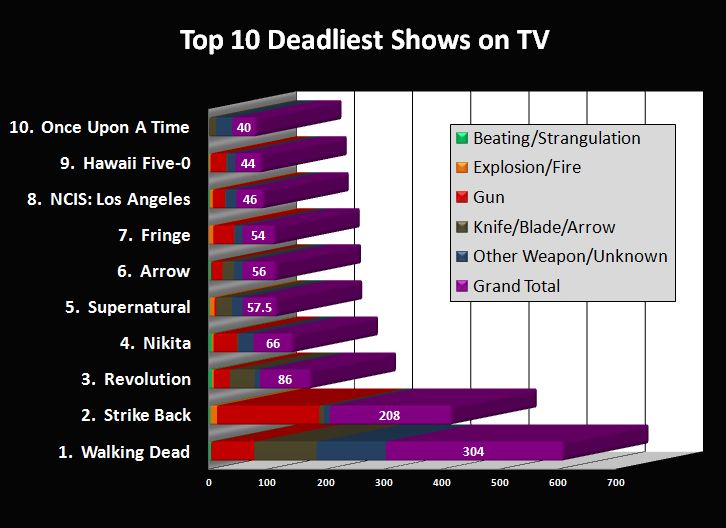TV Body Counts are Up According to a New Study Zombies and Men are the Top Targets; Guns and Blades are the Weapons of Choice
Funeralwise.com has released the results of its second TV Body Count Study. Using counts of dead bodies appearing in television programs, the goal of these studies is to characterize how death is portrayed in popular culture. An online funeral planning service, Funeralwise hopes to stimulate discussion about how people deal with death in real life vs. how they view death as fictionalized in the media.
The second edition of the TV Body Count Study expanded on last year’s initial study by adding new criteria such as the causes of death on TV. One resulting finding is that gunshot victims comprised 44% of all deaths observed in the study. The next closest identifiable cause was knives and blades, which accounted for 19% of deaths.
The Fall 2012 Study also catalogued the gender of the dead, and found that men were, by far, the most likely to die on TV. Males represented 86% of the dead bodies counted, with over 50% dying from a gunshot. Females had fewer onscreen deaths and were more likely to be killed by means other than a gun, such as beatings and strangulation.
The fall season’s deadliest show was the AMC series The Walking Dead which averaged 38 dead bodies per episode. 91% of these dead bodies were zombies. The next deadliest was the CINEMAX series Strike Back, with 26 dead bodies per episode. In total, the 40 TV series studied averaged 4.7 dead bodies per episode, which is a 12% increase over the initial study.
Among the other key findings of the study were:
- The primary cause of death differed for humans and non-humans (zombies, vampires, etc.). Humans died most frequently (52% of the time) from gunshots while for non-human victims the most frequent cause was knife, blade, arrow or various other means.
- The top 3 deadliest shows comprised 40% of the total bodies counted, averaging 25 bodies per episode. The other 37 shows averaged just over 3 dead bodies per episode.
- Action/adventure shows were the deadliest averaging nearly 15 dead bodies per episode, followed by science fiction/fantasy shows averaging almost 10 dead bodies per episode. Crime/courtroom dramas averaged less than 3 dead bodies per episode.
- The dead are rarely memorialized, only 11 funerals were observed by the study.
“We expected to find a fair number of dead bodies on TV, but having completed two studies we are surprised by just how much death we have seen. Our intent is not to pass judgment on the TV shows that portray death and violence. Our job is to report the findings and then let people form their own opinions.” said Rick Paskin, Managing Director of Funeralwise.com.
A full report of the study results and methodology is available on the Funeralwise.com website at www.funeralwise.com/studies/tv-body-count-study-results-fall-2012.
Funeralwise invites comments on how death is portrayed on television and its impact on real life. Comments can be posted on the Funeralwise Digital Dying blog at http://blogs.funeralwise.com/dying/2013/02/08/is-a-sickness-spreading-violent-tv-in-faraway-countries/ and the Funeralwise Facebook page at www.facebook.com/funeralwise. Twitter: @funeralwise. Hashtag: #tvbodycount.
Funeralwise.com offers free, do-it-yourself funeral planning via its website. Aiming to provide “Everything You Need to Know About Funerals,” the site also features extensive information on funeral customs, funeral etiquette and grief support.




